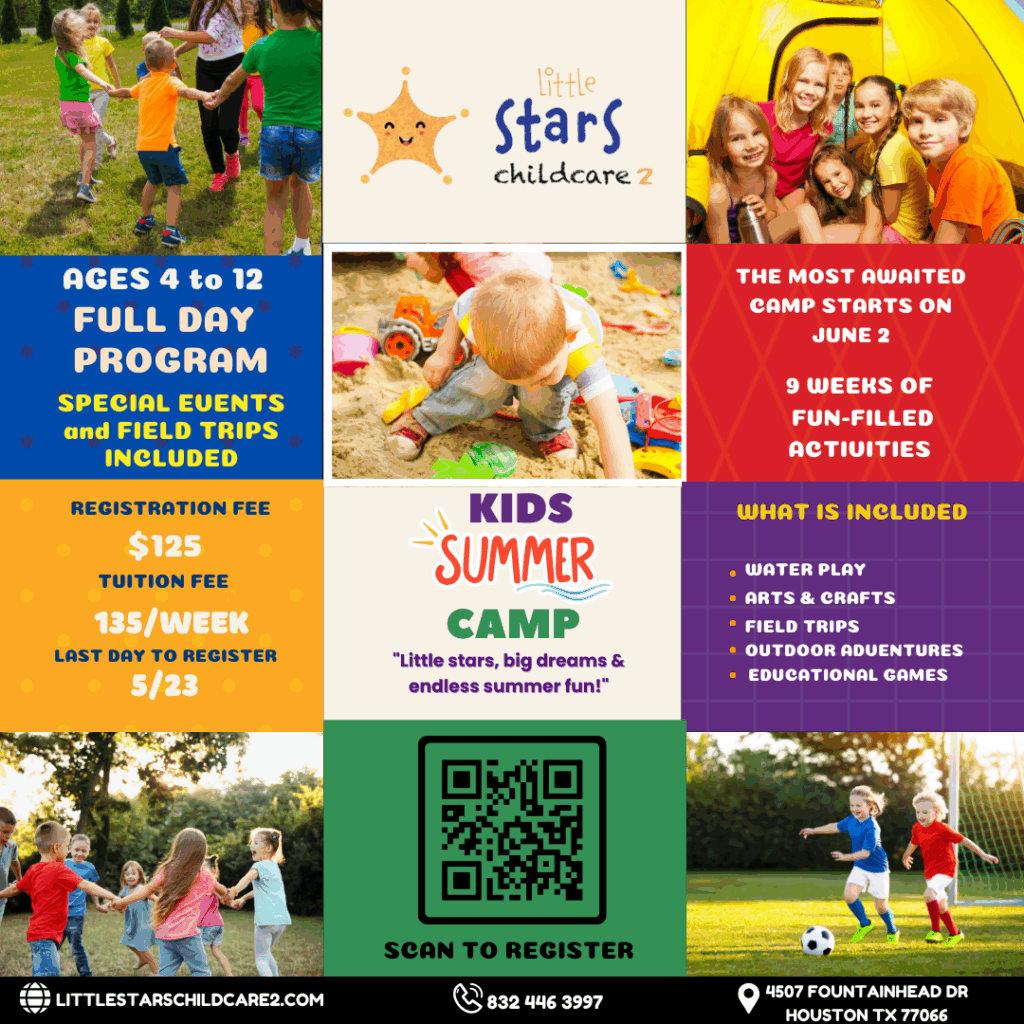Parent Resources
- Home
- »
- Parent Resources
A Parent’s Guide to Child Care Programs
At the Little Stars Child Care, we work closely with the Texas Health and Human Services Commission (HHSC) to ensure all protocols and standards of care are not just followed, but exceeded.
The HHSC is an excellent resource for parents to learn more about licensed child care facilities, such as our daycare on Houston. The below information is an excerpt from their site that we wish to provide to our parents as upfront information.
A child care program can have a tremendous influence on your child. A good program may improve language skills, social skills, and build self-esteem. While no child care operation can replace a parent’s love and attention, well-chosen child care can complement your efforts and enhance your child’s development.
When you choose regulated child care, you and your family join in new experiences and relationships. You, the child care director and/or primary caregivers have a responsibility to protect the health, safety and well-being of your child. The Texas Child Care Licensing Division, is part of this partnership, too.

The Child Care Licensing Division (CCL) protects children in child care settings through regulation and education. With the assistance of child care providers and experts in areas such as child development, early childhood education, fire safety, health and sanitation, Child Care Licensing develops minimum standards.
CCL inspects licensed child care centers, such as before and after-school programs, school-age programs, and licensed and registered child care homes to make sure these operations meet the minimum standards for their child care program. All regulated child care operations must meet basic health and safety requirements.
CCL also investigates all reports of abuse or neglect and violations of the minimum standards and licensing laws. One example would be a report of an individual providing child care to an unrelated child without a permit. These operations are unregulated and considered illegal operations.
What should you know when searching for a child care program?
While each child care operation is responsible for meeting minimum standards, many child care operations exceed these requirements. Each operation has its own special personality and approach to educating and caring for children. Your child will benefit from the time you spend researching and choosing a child care operation that meets the needs of your child and your family. Child care is a choice. Make it an informed one by following these steps:
Research your options. If possible, begin gathering basic information several months before you think you will need child care. Many operations have waiting lists.
- Check out the website – www.dfps.state.tx.us to view the minimum standards for the type of child care program you are interested in.
- Check out the website – www.TxChildCareSearch.org to find regulated child care operations. You can also view details about services offered by the child care operation, inspection dates, and any minimum standard violations.
- Talk to friends, family, and other parents about their recommendations of regulated child care.
Narrow your list to a few child care centers or homes that interest you.
- Arrange to visit the child care operations to compare their programs. If you did not review the inspection reports on our website, you will want to ask each operation about their history with Licensing.
- Visit the operation when children are in care so you can see the type of activities the children are engaged in and you can see how the caregiver interacts with children. Keep in mind the individual needs of your child. Imagine what it would be like to spend 10 hours every day in that environment. You may want to ask if you could bring your child to the operation and spend a couple of hours so your child can explore the operation and interact with the caregiver.
- Meet with the caregiver or Director. Discuss any of your concerns and make sure your questions are answered to your satisfaction. Use the Top 10 Questions to Discuss when Choosing Child Care when talking with the caregiver and Director. If you have any reservations about the caregiver or the operation, trust your instincts and keep looking. You may want to come back to the operation unannounced.
Finally, make a pros and cons list and choose the most appropriate child care program for your child and your family. If you have any specific questions about an operation’s compliance with minimum standards before you make your choice feel free to contact your local Licensing office.
What responsibilities do you have as a parent?
It is important that you establish a good relationship with your child care operation. Parent involvement and active communication can ensure a positive child care experience for both you and your child. Here are some other responsibilities you have as a parent:
- Provide the necessary information. The child care operation must obtain certain information from the parent about their child upon enrollment. It is important you provide this information so the child care operation can ensure the health and safety of your child. Some examples are:
- Complete list of emergency contacts and persons your child may be released to.
- Emergency care authorization and physician information.
- Current list of immunizations.
- Preschool health statement.
- Indication of any special needs or allergies.
- Medication authorizations.
- Read all the material the child care operation provides to you. A licensed or registered child care provider is required to provide you with a copy of their operational policies. It is important that you read, understand, and ask any questions.
- Keep talking with your child’s caregiver. Good communication with your child and child’s caregiver is vital from the very beginning and will help ensure good care for your child. Be mindful that a caregiver’s main responsibility is the supervision and care of children. If having a discussion with your caregiver becomes a distraction, it may be a good idea to set up a conference time.
- Be your child’s advocate. Ask your child about their day, what they did, who they saw or anything special that day. Share their excitement about new friends, new skills, listen to their concerns and give them a chance to boast about their achievements.

